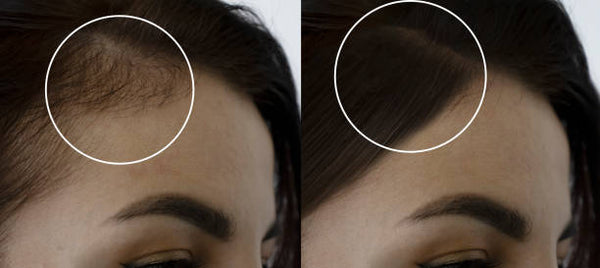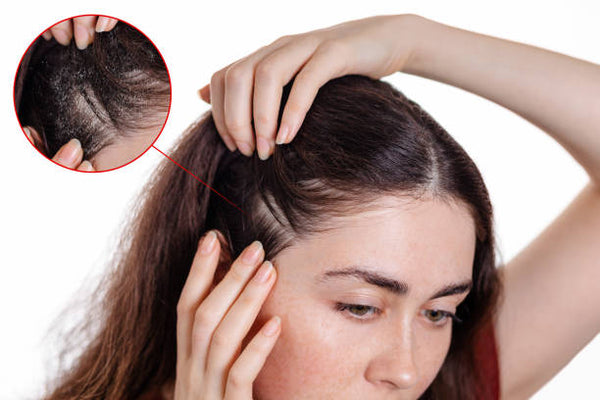Polycystic Ovary Syndrome (PCOS) and Its Impact on Scalp and Body Hair

Polycystic Ovary Syndrome (PCOS) is a hormonal disorder that affects millions of individuals worldwide. One of its most noticeable effects is on hair health, manifesting as androgenetic alopecia (scalp hair loss) and hirsutism (excessive hair growth on the body and face). The overproduction of androgens in PCOS disrupts the normal hair growth cycle, weakening hair bonds and altering follicular activity. This imbalance highlights the need for targeted treatments to manage hair loss, support follicle health, and restore hair strength.

How PCOS Affects Scalp and Body Hair
-
Androgen Overproduction and Hair Loss
Excess androgens cause hair follicles on the scalp to shrink, leading to thinning hair, a condition known as androgenetic alopecia. -
Altered Hair Growth Cycle
PCOS disrupts the balance of the hair growth cycle, shortening the anagen (growth) phase and prolonging the telogen (resting) phase, which results in excessive shedding. -
Hirsutism and Excessive Body Hair
Elevated androgen levels stimulate hair growth in areas such as the face, chest, and back, causing hirsutism. -
Follicular Miniaturization
In androgenetic alopecia, hair follicles become smaller and weaker over time, producing thinner, fragile strands that are more prone to breakage.
The Impact of PCOS on Hair Bonds
-
Weakened Structural Integrity
Hormonal imbalances lead to weaker keratin bonds, reducing the strength and elasticity of scalp hair. -
Increased Hair Breakage
Miniaturized follicles produce hair with compromised bonds, making it more prone to breakage. -
Impaired Scalp Health
PCOS-related inflammation disrupts the scalp microbiome, weakening the environment necessary for healthy hair growth. -
Fragility of Scalp Hair vs. Robust Body Hair
While scalp hair becomes finer and weaker, body hair becomes coarser and darker due to androgen stimulation.
Benefits of Bond Repair Treatments for PCOS-Affected Hair
-
Strengthening Scalp Hair
Bond repair treatments rebuild keratin bonds, restoring strength and thickness to thinning hair strands. -
Reducing Breakage
By reinforcing hair structure, bond repair treatments minimize breakage and improve scalp hair manageability. -
Improving Hair Density
Targeted bond repair therapies support follicular health, helping slow down hair thinning caused by androgenetic alopecia. -
Protecting Hair from Environmental Damage
Bond repair products create a protective layer around hair strands, shielding them from pollution and UV rays, which exacerbate PCOS-related hair issues.
Key Ingredients for Managing PCOS-Related Hair Issues
-
Keratin for Bond Restoration
Rebuilds the structural integrity of weakened hair, improving strength and elasticity. -
Niacinamide for Scalp Health
Reduces inflammation and regulates sebum production, creating an optimal environment for hair growth. -
Saw Palmetto for Androgen Control
Inhibits the effects of DHT (a potent androgen), slowing down follicular miniaturization and scalp hair loss. -
Hyaluronic Acid for Hydration
Maintains scalp hydration, reducing dryness and flakiness often associated with PCOS. -
Biotin for Follicular Support
Boosts keratin production and improves the health of hair follicles. -
Pumpkin Seed Oil for Hormonal Balance
Rich in zinc and phytosterols, it helps regulate androgen activity and promotes healthier scalp hair.
How Bond Repair Treatments Enhance Hair Recovery for PCOS
PCOS creates unique challenges for both scalp and body hair, necessitating solutions that focus on restoring the health of scalp hair bonds while managing hormonal impacts.

Enhancing Bond Repair Results for PCOS-Related Hair Damage
-
Hydration and Nourishment
Hydrating bond repair treatments ensure scalp hair remains moisturized and less prone to breakage. -
Targeted DHT Blocking
Incorporating DHT-blocking ingredients into bond repair products helps slow down the progression of androgenetic alopecia. -
Scalp-Friendly Formulations
Using products free from harsh sulfates and parabens protects the sensitive scalp environment from further disruption. -
Regular Use of Leave-In Treatments
Leave-in bond repair products provide continuous nourishment, promoting stronger and more resilient hair strands.
FAQ
-
How does PCOS lead to scalp hair thinning and body hair growth?
PCOS causes an overproduction of androgens, which shrink scalp hair follicles, leading to thinning and shedding. On the body, these same hormones stimulate excessive hair growth, known as hirsutism. -
Can bond repair treatments reverse PCOS-related hair thinning?
While bond repair treatments cannot directly address hormonal imbalances, they can strengthen hair, reduce breakage, and improve overall scalp health. -
Are there specific ingredients that help with PCOS-related hair loss?
Yes, ingredients like saw palmetto, pumpkin seed oil, niacinamide, and keratin are effective in supporting scalp hair and slowing down androgenetic alopecia. -
Can lifestyle changes help improve PCOS-related hair issues?
Yes, adopting a healthy diet, regular exercise, and stress management can help regulate hormones and improve overall hair health. -
How often should bond repair treatments be used for PCOS-related hair damage?
Weekly deep treatments combined with daily nourishing leave-in products are recommended for optimal results.
PCOS presents unique challenges for hair health, but targeted solutions like bond repair treatments, DHT-blocking ingredients, and scalp-friendly products can mitigate these effects.



